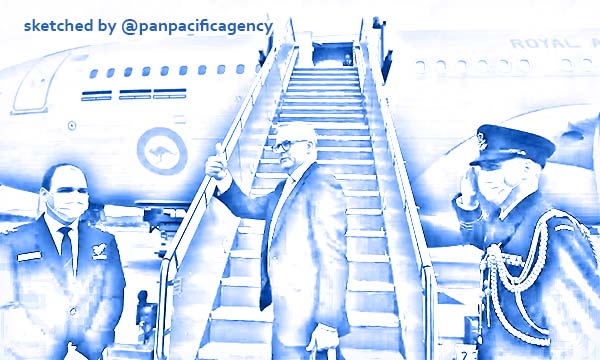Australia’s new PM flags ‘difficult’ China ties as he heads to Tokyo for Quad meeting

Australian prime minister Anthony Albanese boards the plane to Japan to attend the Quad leaders’ meeting in Tokyo. Photograph: Lukas Coch/AAP. Sketched by the Pan Pacific Agency. Images.
CANBERRA, May 23, 2022, The Guardian. Anthony Albanese will fly to Tokyo on Monday to take part in the Quad leaders’ meeting, just hours after being sworn in as the new Australian prime minister and warning that relations with China would remain “difficult”, The Guardian reported.
The Labor party defeated the Coalition government, led by Scott Morrison, on Saturday. It is not yet known whether the Labor party, which Albanese leads, will reach the 76-seat majority needed to govern in its own right.
In his first press conference as prime minister, Albanese said he had received a guarantee of supply from independent and minor party MPs to ensure he can govern no matter the outcome.
The 59-year-old said he and a small interim ministry – including the new foreign minister, Penny Wong, who will travel with Albanese to Tokyo – had been quickly sworn in to ensure Australia could participate in the bilateral meetings with the US president, Joe Biden, the Indian prime minister, Narendra Modi, and the Japanese prime minister, Fumio Kishida.
“The meetings that we will have, not just with the United States but importantly with our hosts in Japan and India, are going to be very important, in a good way, to send a message to the world that there’s a new government in Australia,” Albenese told reporters.
“It’s a government that represents a change, in terms of the way that we deal with the world on issues like climate change, but also a continuity in the way that we have respect for democracy and the way that we value our friendships and longtime alliances.”
Albanese said Australia’s relationship with China, which has soured in recent years, “will remain a difficult one” but signalled his government would take a less aggressive approach to pursuing Australia’s national interest.
“It is China that has changed, not Australia, and Australia should always stand up for our values, and we will do so in a government that I lead,” he said.
It is only the fourth time in Australia’s history that Labor has won government from opposition, and the first time that victory has been less than emphatic.
Labor party leader, Anthony Albanese, celebrates with Labor senate leader, Penny Wong at a Labor party event
Australia’s government is changing after nine years of the Coalition – what happens next?
Read more
The result comes despite a swing away from both major parties towards independent candidates and the Australian Greens, both of which campaigned for stronger targets to reduce global heating.
Albanese delivered his press conference on Monday in front of not just the Australian flag, but the Aboriginal and Torres Strait Islander flags as well. It was a small change that signalled his government’s commitment to seeking constitutional change in line with the recommendations put forward at a national summit of Aboriginal and Torres Strait Islander peoples in 2017.
Seeking a referendum to change the Australian constitution to enshrine an Indigenous voice to parliament was the first commitment Albanese made in his victory speech on Saturday night.
Labor’s incoming Indigenous affairs minister, Wiradjuri woman Linda Burney, said the reform would “change the face of this country” and help Australia “grow up” as a nation.
Votes are still being counted across Australia. Some conservative MPs have refused to concede their seat until the postal votes, which are higher than usual due to Covid-19, have also been counted.
As of Monday, it appeared that independent candidates targeting the conservative Liberal party’s wealthy inner-city heartland on a policy of climate action, political integrity and gender equality have claimed five seats from the Coalition in Melbourne, Sydney and Perth. They have also won the seat of Kooyong, held by former Australian treasurer Josh Frydenberg.
Western Australia, a state which traditionally held more Liberal-voting seats, recorded a 10.7% swing towards the Labor party, spurred on by the popularity of its Labor state premier, Mark McGowan.
And Queensland, the state that awarded Morrison victory in 2019, voted heavily for the Australian Greens, earning it the new nickname “Greensland”. The minor party won two inner-city Brisbane seats – in the process ousting the woman who would have been Albanese’s environment minister – to have three MPs in the lower house of parliament. It is also on track for a record vote in the Senate.
Morrison stepped down as leader of the Liberal party after conceding the election to Albanese on Saturday night. His position is likely to be taken by the former home affairs minister, Peter Dutton.